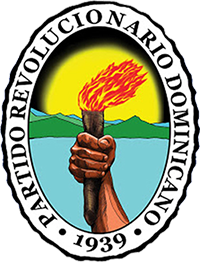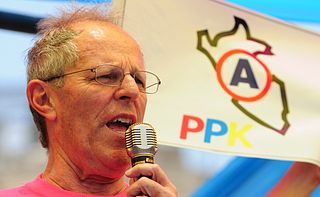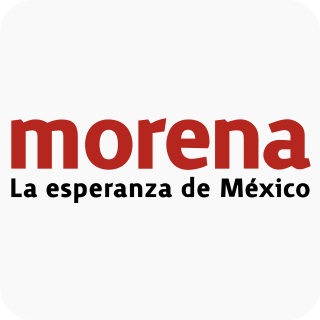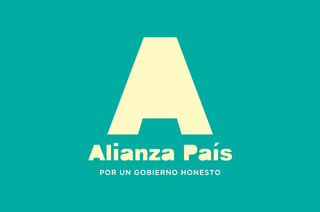
The politics of Mexico take place in a framework of a federal presidential representative democratic republic whose government is based on a congressional system, whereby the President of Mexico is both head of state and head of government, and of a multi-party system. The federal government represents the United Mexican States and is divided into three branches: executive, legislative and judicial, as established by the Political Constitution of the United Mexican States, published in 1917. The constituent states of the federation must also have a republican form of government based on a congressional system as established by their respective constitutions.

The Dominican Republic is a representative democracy, where the President of the Dominican Republic functions as both the head of the government and head of the multi-party system. Executive power is exercised by the government. Legislative power is vested in the bicameral National Congress. The Judiciary is independent of the executive and the legislature.

The Party of the Democratic Revolution is a social democratic political party in Mexico. The PRD originated from the Democratic Current, a political faction formed in 1986 from the Institutional Revolutionary Party (PRI). The PRD was formed after the contested general election in 1988, which the PRD's immediate predecessor, the National Democratic Front, believed was rigged by the PRI. This sparked a movement away from the PRI's authoritarian rule.

The Senate of the Dominican Republic is the upper legislative chamber in the bicameral legislature of the Dominican Republic, and together with the Chamber of Deputies makes up the Congress.

Leonel Antonio Fernández Reyna is a Dominican lawyer, academic, and was the 50th and 52nd President of the Dominican Republic from 1996 to 2000 and from 2004 to 2012. Since January 2016, he is the President of the EU–LAC Foundation.

The Social Christian Reformist Party is a Christian democratic right-wing political party in the Dominican Republic. It was established on July 24, 1984, by the union of Joaquín Balaguer's Partido Reformista and the Partido Revolucionario Social Cristiano. Some of the PRSC's founders and leaders were originally business leaders and Roman Catholics who opposed the communist, socialist, and social democratic tendencies of Juan Bosch, the Dominican Revolutionary Party (PRD) and the Dominican Liberation Party (PLD).

The Dominican Liberation Party is a political party in the Dominican Republic. Founded in 1973 by former president Juan Bosch, the party, along with the Dominican Revolutionary Party, has dominated politics in the country since the establishment of democracy in the late 1960s. The PLD have won several elections since the late 1990s and had held control over much of the government until 2020, when the Modern Revolutionary Party won several governmental seats as well as the Presidency with the election of Luis Abinader as President. The PLD party's logo is a yellow five-pointed star on a purple background.

The Dominican Revolutionary Party is a political party in the Dominican Republic. Traditionally a left-of-centre party and social democratic in nature, the party has shifted since the 2000s toward the political centre. The party’s distinctive color is white. Traditionally, the party has two presidents: the "Titular President" and the "Acting President" ; until 2010 the Presidents and the Secretary-General were proscribed to run for any elected office.

The Labor Party is a political party in Mexico. It was founded on 8 December 1990. The party is currently led by Alberto Anaya.
The Democratic Renewal Party was a political party in Portugal, founded in 1985 with the political support of the then independent President of the Republic, Ramalho Eanes, and lasting until 2000. At the time of its foundation, it was meant to "moralize Portuguese political life" and the party positioned itself in the political centre. Its first leader was Hermínio Martinho.
The People's Democratic Party is a minor political party in the Dominican Republic. It first contested national elections in 1974, when it provided the main opposition to the ruling Reformist Party due to the Dominican Revolutionary Party not contesting the elections. Its candidate, Luis Homero Lajara Burgos, received 15% of the vote in the presidential election, whilst the party won three seats in the House of Representatives. In 1978 many of the opposition parties returned to the electoral scene. Burgos received only 0.4% of the vote in the presidential election, whilst the party lost all three seats in the House of Representatives after a similar result in the Congressional elections.

The National Citizen Will Party, formerly known as the National Civic Veterans Party, is a minor Christian-democratic and social-conservative political party in the Dominican Republic. It was founded on 10 May 1973 by Sergeant Federico Marte Pichardo, under the initiative of then-President Joaquin Balaguer, and was renamed on 8 March 2015. It is currently directed by Juan Cohen.

The Alliance for the Great Change—PPK was an electoral alliance in Peru formed for the 2011 general election to promote the presidential candidacy of Pedro Pablo Kuczynski ("PPK").

Presidential elections were held in the Dominican Republic on 20 May 2012. They were the fifth quadrennial elections for the presidency and vice-presidency since 1998, when a change in the electoral law separated the presidential from the congressional and municipal elections.

MORENA is a Mexican political party with Cardenist roots. It is the ruling party of Mexico since 2018.

The Modern Revolutionary Party is a political party in the Dominican Republic. It emerged after a new division within the Dominican Revolutionary Party (PRD). It was recognized on 9 September 2014. The PRM is the legal heir of the Dominican Social Alliance.

Social Encounter Party was a Mexican conservative political party established on the national level in 2014 and dissolved in 2018. It was part of the coalition Juntos Haremos Historia with the National Regeneration Movement and Mexico's Labor Party for the 2018 Mexican election.

The Country Alliance is a political party in the Dominican Republic founded in 2011 by Guillermo Moreno and other citizens. It is an emerging political party, with a progressive orientation that is ideologically located between the center-left and the left. In the 2016 general elections, ALPAÍS positioned itself as the non-traditional party with the largest number of votes, obtaining congressional representation without the need for an alliance with said parties.














